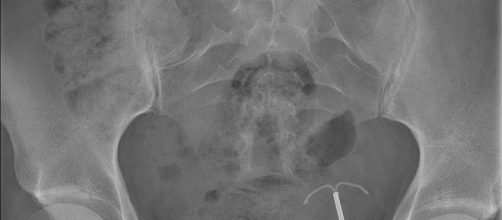According to a report in the New England Journal of Medicine, two surgical sponges were left in a woman’s abdomen for nearly six Years. The woman had been experience discomfort and bloating. She went to a clinic and the doctors performed a CT scan. When the results came back, the specialists noticed unfamiliar objects inside her abdomen. The two masses seemed to be attached to her omentum and colon. The surgeons performed a quick and succesful surgery removing the sponges after which the patient's symptoms subsided. The 42-year-old woman was later discharged.
Results of the CT scan and X-ray
Speaking to CNN, Dr. Takeshi Kondo, lead author of the report, concluded that the sponges might have been left during a cesarean section. In the official report, Kondo states that the patient had had two cesarean sections in the same hospital, the last operation being six years ago. The unidentified woman did not have other pelvic or abdominal operations after her last cesarean section. After learning she had been carrying two sponges inside her for six years, the woman went to confront the surgeon responsible, but the doctor refused to admit his mistakes.
Other reports of 'human error'
According to a study by The Organization for Economic Co-operation and Development, researchers found that surgeons in Canada leave sponges and knives in patients more than specialists in any other country: Katerina Gapanenko told Global News, sponges account for approximately 70 percent of the items found in patients' bodies.
Surgical Instruments such as blades and clamps make up for the remaining 30 percent. These mistakes are considered a surgeons worst nightmare and are often referred to as ‘never events.’ Such a case may ruin a doctor's reputation and probably end his or her career.
American Society of Anesthesiologists reports more than 4500 cases of surgical instruments being left inside patients every year.
These surgical tools may cause a lot of pain, bloating and discomfort to some patients. In other severe cases, the objects have been known to cause sepsis or death.Dr. Atul Gawande, director of Ariadne Labs in Boston, told CNN he came across a case in which the patient had a sponge left inside his brain, the sponge led to an infection that ultimately led to the death of the individual.
Sylvie Dube is one of the victims of such cases. A 33-centimeter long blade was left in her abdomen after she underwent a hysterectomy at Montreal Hospital. After reports of the incident were made public in 2007, the health minister blamed 'human error.'


